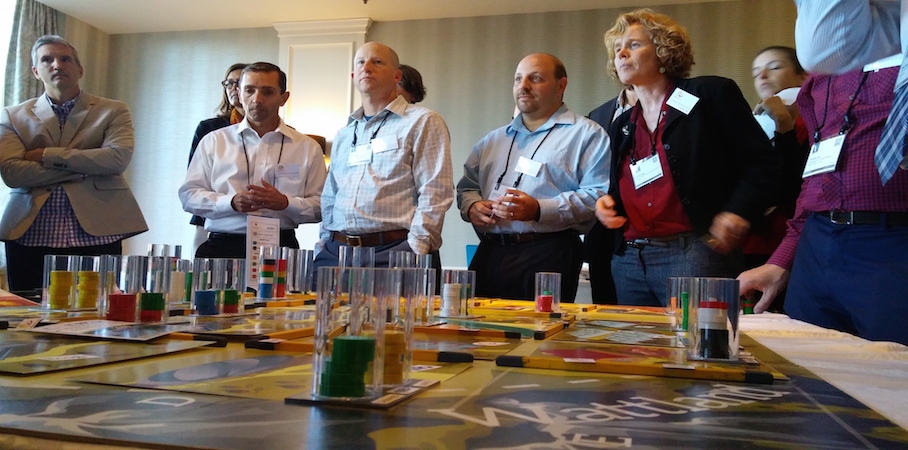
“You learn more about a person in an hour of play than a year of conversation.”
– Plato
If you look at other human-made systems such as healthcare, agriculture, fishing, clothes manufacturing, mining, transportation, etc. you can see they’re all in transition. In the end, these transitions will rely on sparking the most difficult change of all: human behaviour. It will require a deeper systemic understanding.
It was silent in the room and the windows were fogged. Twenty-two slightly bewildered faces stared back at me. We had just played our energy transition role playing game, The Newtonian Shift, for the first time with the leadership team of the Eneco Group, an innovative Dutch energy utility company. After four hours of dynamic game play, the silence gave participants time to make sense of what happened. I hesitatingly opened the conversation: “And…how are you all doing?”
“I’m surprised by how much this experience feels like real life in our organization,” one participant shared.”
I had the Accounts Manager role, which allowed me to negotiate and make deals with other players. But in the second round, my clients created their own energy for a much lower price and were selling it. They even asked me if I wanted to buy energy from them! It was like the world turned upside down. I feel like this in real life too. With all these industry changes, it’s hard for me to find my place.
Another player joined in: “I took the opportunity to play as ‘Boogle’ (aka Google) in the game. In this role, I could really disrupt the energy system and I took that opportunity,” he smiled from ear-to-ear. “I deliberately put people out of business that belong to the same industry as we do in real life.”
“It helped me realize that if we don’t start collaborating with these disruptive organizations to change our existing business models, we won’t be around much longer.”
This conversation went on for a long time, creating a mutual sense of urgency to address market and resource issues, and fueling a conversation that is still happening in their company. The game quickly prompted new questions, presented different perspectives, and sparked creativity. It created a level of conscious incompetence, highlighting gaps, so organizations could make plans and develop ideas to change patterns, behaviours, and leadership.
If the game could have this impact on a company, could it also inspire and influence an entire system? In 2015, Cheryl DePaoli, Alberta Real Estate Foundation ED, connected us with The Energy Futures Lab. The EFL is dedicated to the same principles as we are: new ideas, moving beyond polarization to build empathy, and fostering collaboration. We learned that when it comes to the energy system, Albertans were asking big questions, dealing with great challenges, and needed new methods.
Our initial encounter with the EFL was also at the time of the Alberta election, where the NDP won by a landslide, changing the political landscape in the province.
We couldn’t ask for better timing.
The Eneco Group, commissioned my company, Fresh Forces, to create this game in 2013. They wanted an experience that brought the energy transition closer to the hearts and minds of their 7,000 employees. It did this remarkably well, and became a catalyst for many other energy transition related initiatives within Eneco, co-created by Fresh Forces, including a new performance management program, creative team sessions, an innovation battle, and a leadership development program.
The game provided a space to explore a new energy narrative. It seemed changes in the energy sector were only being communicated in media headlines and academic papers, with numbers, graphs, and charts. And, too often, the tone reflected the old human habit of blame and shame: it was always the fault of corporations, consumers, the government, or another particular group. We wanted the game to go beyond a circular debate and pointing fingers. It needed to increase understanding and empathy, acknowledging that successful collaboration requires trust.
Gaming is no panacea, but it’s an important tool to access a deeper level of understanding.
We played many times with teams and departments within the Eneco, before joining forces with the utility company to bring the game to organizations in Europe and North America, including Alberta with the EFL. Together, we adapted the game to better resemble Alberta’s energy system, including an oil company responsible for tar sand extraction and a First Nations community. It has been played with the Fellows a few times now and is ready to be played within their partner organizations.
Fresh Forces and the EFL also facilitated the game during GLOBE 2016 in Vancouver, with a diverse mix of participants working in energy systems across the world.
One of the founding fathers of gaming and simulation for organizational change, Richard Duke, wrote a groundbreaking book called: Gaming: the Future’s Language. Having worked intensely with gaming and simulation for over ten years now, I believe this future has arrived. If you look at other human-made systems such as healthcare, agriculture, fishing, clothes manufacturing, mining, transportation, etc. you can see they’re all in transition. In the end, these transitions will rely on sparking the most difficult change of all: human behaviour. It will require a deeper systemic understanding.
Collaboration will become increasingly important as we fall back on our tendencies to blame and shame. We will have to embrace that we are all in this together. So we might as well show compassion and work with one another. And beyond the important function gaming and simulation plays in systems change, how cool, liberating, and fun is it to just PLAY with each other?
——-
Join the EFL and play The Newtonian Shift on May 26th.

Maarten Robben is a partner at Fresh Forces.



